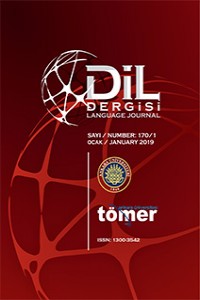Abstract
Yabancı dil öğrenmeye mümkün olan en erken yaşta
başlamak, yalnızca dilin öğrenilmesindeki başarı açısından
değil bireyin gelişimi açısından da önemlidir. Ancak geçilmesi
durumunda dil öğrenmenin zor hatta olanaksız olduğu bir yaş
sınırı bulunmamaktadır. Her yaş grubunun süreçte kendine
özgü elverişlilikleri ve zorlukları bulunmaktadır. Çocuklar 6-7
yaşına yani beynin olgunluğa erişmesine kadar olan devrede,
uygun koşullar sağlandığı takdirde dilleri tıpkı anadillerinde
olduğu gibi doğal ve bilinçsiz bir biçimde edinme yetisine
sahiptirler. Bu yaştan sonra ise beynin olgunlaşmasıyla
birlikte bu mekanizma yerini yetişkinlerde olduğu gibi,
bilinçli öğrenme mekanizmasına bırakmakta ve süreç
farklılaşmaktadır. Önemli olan yabancı dil öğretimi/öğrenimi
sürecini yaş grubunun özellikleri ve gereksinimlerine göre
planlamak ve uygun koşulları sağlamaktır. Burada, öğrenilen
dille temas süresinin fazlalığı, öğretim/öğrenimin sürekliliği,
yaşa uygun teknik, materyal ve etkinliklerin kullanılması çoğu
zaman öğrenenin yaşından daha önemli parametreler olarak
karşımıza çıkmaktadır.
Keywords
Erken Yaşta Yabancı Dil Öğretimi/Öğrenimi Dil Edinimi Yabancı Dil Öğrenme Stratejileri Motivasyon
References
- Kaynakça Bialistock, E. ve Hakuta, K. (1999). Confounded Age; Linguistique and Cognitive Factors in Age Differences For Second Language Acquisition. In: D. Birdsong (Ed.) Second Language Acquisition and the Critical Period Hypothesis. Mahwah, NJ: L. Erlbaum. 1-22.
- Birdsong, D. (1992). Ultimate Attainment in Second Language Acquisition. Langage, 68, 706-755.
- Bongaerts, T., van Summeren, C., Planken, B. ve Schils, E. (1997). Age and Ultimate Attainment in the Pronunciation of Foreign Languages. Studies in Second Language Acquisition, 19 (4), 447-465.
- Bozavlı, E. (2013). Erken Yaşta Yabancı Dil Öğretiminin Tarihsel Süreci ve Amaçları. Kastamonu Eğitim Dergisi, 21 (4), 1561-1574.
- Cohen, R. (1991). Apprendre le plus jeune possible. Le Français dans le monde - Recherches et applications. Enseignements/apprentissage précoces des langues, (özel sayı), 48-56.
- Conseil de l’Europe. Cadre européen commun pour les langues. Paris: Didier.
- Cuq, Jean-Pierre (2003). Dictionnaire de didactique du français langue étrangère et seconde. Paris: Clé International
- Cyr, P. (1998). Les Stratégies d’apprentissage. Paris: Clé International.
- Dalgalian, G. (2002). L’Apprentissage précoce des langues vivantes: bénéfices, conditions, perspectives. Education et sociétés plurilingues, 12, 31-38
- Gaonac’h, D. (2006). L’Apprentissage précoce d’une langue étrangère. Le point de vue de la psycholinguistique. Paris: Hachette.
- Garabédian, M. (1992). A la découverte d’une langue étrangère. Le Français dans le monde - Recherches et applications. Les Auto-Apprentissages, (özel sayı), 75-81.
- Güven, N. ve Bal, S. (2000). Dil Gelişimi ve Eğitim. 0-6 Yaş Dönemindeki Çocuklar İçin Destekleyici Etkinlikler. İstanbul: Epsilon.
- Hanbay, O. (2013). Çocuklara Yabancı Dil Öğretimi. Ankara: Anı.
- İlter, B. ve Er, S. (2007). Erken Yaşta Yabancı Dil Öğretimi Üzerine Veli ve Öğretmen Görüşleri. Kastamonu Eğitim Dergisi, 15(1), 21-30.
- Kara, Ş. (1999). Erken Yaşta Yabancı Dil Öğrenimi ve Öğretimi. A. Ü. TÖMER Dil Dergisi, 79, 11-17.
- Lenneberg, E., H. (1967). On Explaining Language. Science, 164, 635-643. Long, M. (1990) Maturational Constraints on Language Developpement. Studies in Second language Acquisition, 12, 251-285.
- Mzali, M.-C. (2011). Apprentissage d’une langue: Pourquoi commencer l’enseignement très tôt? (Lises Irlande-Guibault söyleşi) http://www.vosquestionsdeparents.fr/dossier/544/languesetrangeres-quapporte-un-enseignement-precoce adresinden 21.07.2018 tarihinde indirilmiştir.
- Nikolov, M. (1999). ‘Why do You Learn English?’ ‘Because the Teacher is Short.’ A study of Hungarian Children’s Foreign Language Learning Motivation. Language Teaching Research. 3, 1, 33-56. DOI: 10.1191/136216899670790538.
- Oxford, R. (1990). Language Learning Strategies: What Every Teacher Shoul Know. Booston: Heile & Heile.
- Penfield, W. ve Roberts, L. (1959). Speech and Brain Mechanisms. Princeton: Princeton University Press.
- Piaget, J. (2000). Çocukta Zihinsel Gelişim (Çev. Hüseyin Portakal). İstanbul: Cem Yayınları.
- Pierard, A. (2014). L’Apprentissage d’une seconde langue dès le plus jeune age: quels bénéfices? UFAPEC N. 33.14
- Johnstone, R. (2002). A propos du “facteur de l’âge”: quelques implications pour les politiques linguistiques. Strasbourg: Conseil de l’Europe.
- Singleton, D. (1989). Language Acquisition: the Age Factor. Clevedon, UK: Multilingual Metters.
- Vanthier, H. (2009). L’Enseignement aux enfants en classe de langue. Paris: Clé International.
- Vianin, P. (2007). La Motivation scolaire: Comment susciter le désir d’apprendre ? Bruxelles: De Boeck.
- Wenden, A. ve Rubin, J. (1987). Learner Strategies in Language Learning. London: PenticeHall International.
- White, L. ve Genesee, D. (1996). How Native is Near-native. The Issue of Ultimate Attainment in Adult Second Language Acquisition. Second Language Research, 12, 233-265.
Details
| Primary Language | Turkish |
|---|---|
| Subjects | Linguistics |
| Journal Section | Review Article |
| Authors | |
| Publication Date | February 28, 2019 |
| Submission Date | October 31, 2018 |
| Published in Issue | Year 2019 Volume: 170 Issue: 1 |

